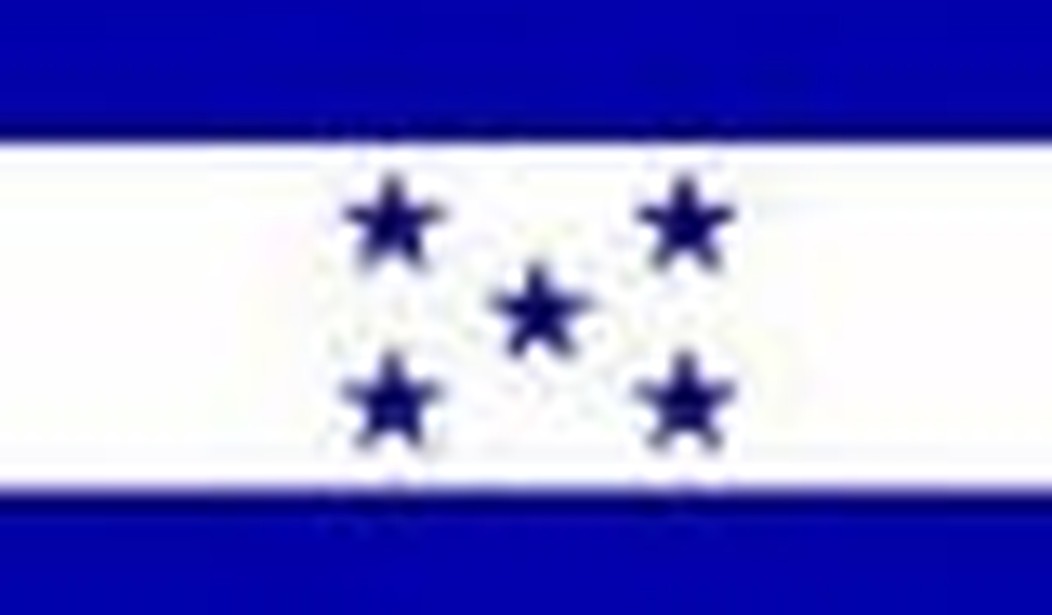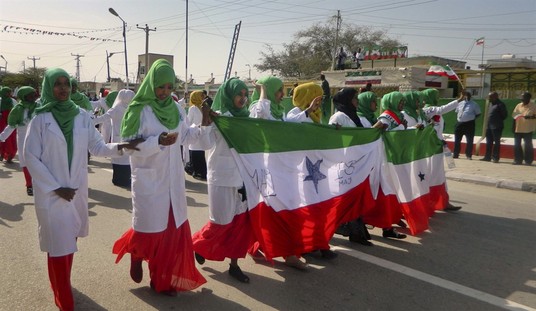Talks in Costa Rica have deadlocked as expected, and former President Manuel Zelaya has stated, also as expected, that “no one can stop me” from returning to Honduras. Meanwhile, the United States continues to steer left.
The Obama administration did many things to cause the likely Honduran civil war to begin — and did little to avoid it. Rather than rush to take sides with Zelaya by declaring his ouster a “not legal” coup and joining with other governments in demanding Zelaya’s reinstatement, the Obama administration should at the very least have remained neutral. That would have meant voting “no” — or even merely “present” — at the UN and at the OAS which, with Obama’s blessing, censured and imposed sanctions upon the Honduran interim government for ousting Zelaya in accordance with the Honduran constitution.
Obama, during his first months in office, tried bizarrely to gain favor with Venezuelan President Hugo Chávez. Obama blew it by thinking he could successfully employ sweet reason with Chávez and his ilk. Unless Obama dons a red beret, gets the Congress to declare a Che Guevara Memorial Day, appoints ACORN to supervise federal and state elections, and designates William Ayers as his new secretary of state, Chávez and his sort will continue to see the United States as their whipping boy and blame her for such occurrences as the “not legal” coup in Honduras.
The Obama administration should have told Chávez to stay out of Honduran affairs at the beginning; it did not. Although Chávez — perhaps with justification — views Obama as a joke or an ignoramus, nothing would have been lost by trying and something might have been gained.
Civil war is now imminent. Actions should be taken now to ameliorate the Honduran situation and to put obstacles in Chávez’s path toward further encroachments upon the internal affairs of other countries. Otherwise, Chávez’s efforts to extend his dominion throughout Latin America will increase and be even more successful than in the past.
As noted here and elsewhere, Chávez faces increasingly severe problems, both domestically and internationally. To some extent, the Honduran crisis is putting some of those problems into the background, but not to the extent that Chávez would like. The United States should make matters worse, rather than better, for Chávez.
The United States, until recently, regarded Latin America as being in her zone of influence. Unless the Monroe Doctrine has lost all meaning, Obama should take at least some little baby steps to honor it.
Obama should state publicly that he is disappointed that Costa Rican President Oscar Arias’ mediation efforts failed and that Zelaya’s return to Honduras is about to cause a civil war supported by Chávez and his fellow travelers. Doubtlessly, Arias anticipated these things but continued to favor Zelaya in ways leading to the very civil war he was to avoid. Even before the meetings in Costa Rica were to resume on July 18, Arias publicly rejected any settlement not resulting in the immediate reinstatement of Zelaya and the ouster of Honduras’ interim president. Arias’ position coincided nicely with that of Zelaya and Chávez and was not a propitious one for a mediator. There was no incentive for Zelaya to soften his position, even as the interim government softened its own. The Obama administration should now tell Arias that it views his approach as highly undesirable. Were Obama, even belatedly, to suggest that Arias change his tune, at least to the extent of not giving further legitimacy to Zelaya’s return by force, it probably would not prevent a civil war. However, it might diminish the legitimacy with which Zelaya’s return will be viewed by the world.
It might also change the nature of the press coverage in the United States which, when not ignoring the Honduran crisis, has generally put a spin on it favorable to Chávez, Zelaya, and Obama and opposed to the interim government. A change in the way that the people of the United States perceive what’s happening would be a very good thing. It might make some of the ideas suggested here more palatable in the United States, even among Obama’s legion of worshipers.
Obama should tell Chávez, politely but firmly, to shut up, get out of Honduras, and have his friends do the same. Chávez would probably ignore and giggle about such advice, but he might not.
Obama, not Bush the Evil and Sulphurous One, is now the president of the United States. Unless Obama’s apology tours have been worthless, this might be seen internationally as conferring at least a modicum of legitimacy on Honduran resistance to Zelaya’s attempts to ignore the Honduran constitution and regain the presidency by force.
Obama — along with Chávez — will deserve much of the blame for a Honduran civil war. Obama should state, publicly and clearly, that the negotiations in Costa Rica failed because of Zelaya’s intransigence, which he, Arias, and Chávez stiffened. Obama should also acknowledge that Zelaya’s return, which he and Chávez sought, will cause a civil war. These, unlike the subjects of his earlier apology tours, are things for which Obama needs to apologize personally; he did them.
Obama should disassociate his administration from Chávez and Zelaya, recognize the interim government as the only viable government in Honduras, exchange ambassadors with Honduras, and provide such “humanitarian aid” as may be requested by that government. The recently reinstated diplomatic relations with Venezuela should again be severed, with specific reference to Chávez’s interference in Honduras. This would be a loud expression of displeasure at Chávez’s activities. As a practical matter, there is very little value in having a United States ambassador in Venezuela and a Venezuelan ambassador in Washington, and it confers unwarranted legitimacy upon the Chávez government.
That legitimacy should instead be conferred upon the Honduran interim government.
Washington should do everything it can to diminish further Chávez’s already shrinking oil revenues. Venezuelan crude oil has many impurities and is difficult and costly to refine. Much of that happens at refineries in the United States, unfortunately under Venezuelan ownership. Some of the “economic stimulus” funds now being wasted elsewhere should be used to promote more domestic oil drilling in the United States and even the construction of a few new refineries. Independently of everything else, these would be good things. The economic effects on Venezuela might not be felt for a long time, but the anticipation of those effects would be immediate and salutary.
Colombia has cooperated with the United States in curtailing drug trafficking and diminishing the power of the FARC leftist guerrillas, who derive their funding principally from cocaine trafficking and kidnappings. Some success is apparent. Chávez has a symbiotic relationship with the FARC, and its activities are also the principal cause of domestic unrest in Colombia. FARC’s incursions into Panamá’s remote and undeveloped Darien Province have increased, due largely to FARC’s problems in Colombia. The United States now provides modest economic support and a few military advisors to Panamá in dealing with them. Enhanced United States-Panamá efforts in the Darien, to discourage the FARC guerillas and to send them back to inhospitable Colombia, would be welcomed by Panamá.
It might help were Colombia and Panama encouraged, financially and otherwise, to cooperate more at their mutual border. Anything that the United States can legitimately do to curtail the FARC and the associated drug cartels — and their support for and from Chávez — would be a good step. This would also provide at least moral support to two of the very few countries in Latin America which remain friendly to the United States and continue to oppose Chávez’s attempts to intervene in their internal affairs.
The United States has failed to ratify the free trade agreement with Colombia, due mainly to concerns that the government of President Alvaro Uribe is not adequately considerate of chavista union activists there. Uribe’s substantial human rights reforms have gone essentially unnoticed, and the FTA is languishing. The agreement with Panama is also languishing, but Panamá now seems to have little interest in it. The FTA would not help Panamá much, and the United States has demanded various unrelated banking reforms. Panamá seems unlikely to agree to these demands. They should cease; they won’t work anyway.
The FTAs with Colombia and Panamá should be ratified, promptly and without renegotiation. This would provide at least moral support to two of the very few countries in Latin America which remain on the side of the United States and continue to oppose Chávez’s incursions. It might even give some encouragement to those in Venezuela who oppose Chávez.
Ideological bent notwithstanding, Obama has to recognize that the successful but bloody reinstatement of Zelaya would be of great value to Chávez, and that its value would be enhanced were the United States to do nothing to prevent or to oppose it. The peaceful, democratic assumption of further control in Latin America by Chávez’s supporters would be bad enough. The violent overthrow by chavistas of Honduras’ constitutionally chosen interim government would be far worse.
The United States, if she is to have any moral authority in the world, must support those who desire freedom and democracy and must oppose those who don’t. The United States failed to take an appropriate stand in Iran until far too late, spoke decisively from ignorance at the beginning of the crisis in Honduras, and seems to be flailing even now. If the current process continues, opportunities to assert such principles may well arise later; then, however, it is likely to be too late for Honduras and may also be too late for the United States effectively to oppose similar processes elsewhere.
Obama is not yet, like Jimmy Carter, a former president. What he says and does are taken abroad, rightly or wrongly, to reflect the consensus view of the United States. Perhaps disturbed by the adverse reaction of many to his bland pronouncements during the initial days of the Iranian crisis, Obama decided that this time, as to Honduras, he would speak promptly and forcefully. He did and again got it wrong. Different statements and different actions are necessary in different circumstances, and the circumstances in Honduras now are very different from those in Iran a few weeks ago. When her president gets it wrong, the United States suffers for a long time. Obama needs seriously to consider his position.









Join the conversation as a VIP Member